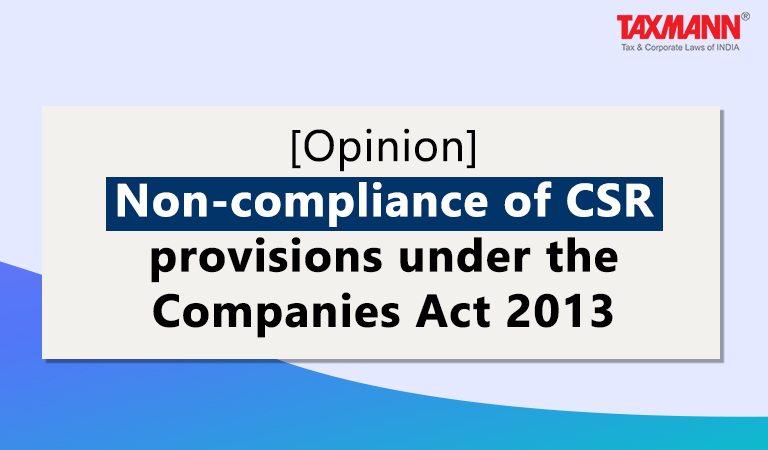[Opinion] Non-compliance of CSR provisions under the Companies Act 2013
- Blog|News|Company Law|
- 3 Min Read
- By Taxmann
- |
- Last Updated on 6 October, 2022

[2022] 143 taxmann.com 12 (Article)
1. Corporate Social Responsibility
On April 1, 2014, our country became the first one in the world to legally mandate corporate social responsibility. The rules in section 135 of the Companies Act 2013 make it mandatory for companies of a certain turnover and profitability to spend 2% of their average net profit for the past three years on corporate social responsibility activities.
2. Role and responsibilities of the board of directors
The following are the gist of the role and responsibilities of board of directors relating to corporate social responsibility.
(a) Upon considering the recommendation made by the CSR Committee, the board of directors need to approve the CSR policy for the company and ensure only those activities must be undertaken which are within the purview of the CSR policy.
(b) The board of directors need to ensure that the company spends a minimum of 2% of the average net profits made during three immediately financial years as per CSR policy.
(c) The report of the board of directors in the annual report needs to disclosure the composition of the CSR Committee, the contents of CSR policy.
(d) In case the CSR spending does not meet 2% as per CSR policy, the reasons for the unspent amount and details of the transfer of unspent amount relating to an ongoing project to a specified fund (transfer within a period of six months from the expiry of the financial year) also needs to be disclosed in the board report.
3. Provisions under the Companies Act 2013 on this matter
The relevant provisions of section 135 (Corporate Social Responsibility) of the Companies Act 2013 is reproduced below:-
Sub-section (5) of section 135 of the Companies Act 2013 states that the board of every company referred to in sub-section (1), shall ensure that the company spends, in every financial year, at least two percent of the average net profits of the company made during the three immediately preceding financial year, or where the company has not completed the period of three financial years since its incorporation, during such immediately preceding financial years, in pursuance of its corporate social responsibility policy.
Provided that the company shall give preference to the local area and areas around it where it operates, for spending the amount earmarked for corporate social responsibility activities.
4. Disclosure in case of failure to spend the CSR amount/transfer of unspent amount to specified fund
Provided further that if the company fails to spend such amount, the board shall, in its report made under clause (o) of sub-section (3) of section 134, specify the reasons for not spending the amount and, unless the unspent amount relates to any ongoing project referred to in sub-section (6), transfer such unspent amount to a fund specified in Schedule VII, within a period of six months of the expiry of the financial years.
5. Penal action in case of default/non-compliance
Sub-section (7) of section 135 of the Companies Act 2013 states that if a company is in default in complying with the provisions of sub-section (5) or sub-section (6), the company shall be liable to a penalty of twice the amount required to be transferred by the company to the Fund specified in Schedule VII or the unspent corporate social responsibility account, as the case may be, or one crore rupees, whichever is less, and every officer of the company who is in default shall be liable to a penalty of one-tenth of the amount required to be transferred by the company to such Fund specified in Schedule VII, or the unspent corporate social responsibility account, as the case may be, or two lakh rupees, whichever is less.
To understand the regulatory action on default / non-compliance, we could go through one the recent decided case on this matter by the Registrar of Companies of New Delhi.
6. The relevant case law on this matter
We shall go through a case relating an adjudication order passed by the Registrar of Companies, New Delhi on 27th September 2022 – order bearing No.ROC/D/ADJ.order/Section135/Comviva/5707-5710 for penalty for violation of section 135 of the Companies Act, 2013 in the matter of M/s Comviva Technologies Limited.
Click Here To Read The Full Article
Disclaimer: The content/information published on the website is only for general information of the user and shall not be construed as legal advice. While the Taxmann has exercised reasonable efforts to ensure the veracity of information/content published, Taxmann shall be under no liability in any manner whatsoever for incorrect information, if any.

Taxmann Publications has a dedicated in-house Research & Editorial Team. This team consists of a team of Chartered Accountants, Company Secretaries, and Lawyers. This team works under the guidance and supervision of editor-in-chief Mr Rakesh Bhargava.
The Research and Editorial Team is responsible for developing reliable and accurate content for the readers. The team follows the six-sigma approach to achieve the benchmark of zero error in its publications and research platforms. The team ensures that the following publication guidelines are thoroughly followed while developing the content:
- The statutory material is obtained only from the authorized and reliable sources
- All the latest developments in the judicial and legislative fields are covered
- Prepare the analytical write-ups on current, controversial, and important issues to help the readers to understand the concept and its implications
- Every content published by Taxmann is complete, accurate and lucid
- All evidence-based statements are supported with proper reference to Section, Circular No., Notification No. or citations
- The golden rules of grammar, style and consistency are thoroughly followed
- Font and size that’s easy to read and remain consistent across all imprint and digital publications are applied



 CA | CS | CMA
CA | CS | CMA
